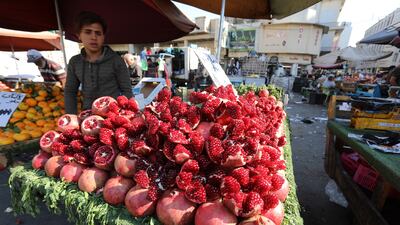Iraq’s economy is recovering from last year’s sharp contraction on the back of higher oil prices and the easing of Covid-19 restrictions, according to the International Monetary Fund.
The country’s non-oil real gross domestic product is expected to rebound by 12 per cent this year, while the fiscal and current account balances are projected to improve significantly, the IMF said, after its officials held an online meeting with the Iraqi authorities on the recent economic developments and policy priorities for the country moving forward.
“Inflation has reached 7.2 per cent in September and is projected to ease in the coming months,” the IMF said. “The fiscal and external current account balances are expected to improve significantly in 2021 from double-digit deficits in 2020, mainly due to higher oil prices.”
Oil prices defied Omicron concerns to trade higher at the end of the week on hopes that the new variant will not derail economic recovery plans.
Brent, the global benchmark for two-thirds of oil, is up more than 34 per cent since the start of the year and was trading at $69.88 per barrel when markets closed on Friday. West Texas Intermediate, the gauge which tracks US crude, has gained about 37 per cent this year to trade at $66.26 per barrel.
“Higher oil revenues present an important opportunity to tackle Iraq’s significant underlying vulnerabilities, strengthen resilience to future climate and other challenges, and advance key socio-economic priorities," the IMF said.
The Washington-based lender, however, said the country should focus on strengthening its public finances, “while creating the fiscal space for much-needed investment and social safety nets and promoting private sector development”.
“To this end, key priorities include a civil service reform aimed at increasing the public sector’s efficiency and containing the wage bill, reducing inefficient energy subsidies, diversifying fiscal revenues, stemming losses in the electricity sector, strengthening governance,” the IMF said.
Iraq should also prioritise the restructuring of large state-owned banks to revitalise the financial sector and ensure the private sector’s access to finance, the lender said.
The country’s economy is expected to grow 3.6 per cent in 2021 and 10.5 per cent next year following a contraction of 15.7 per cent last year due to the pandemic, according to the IMF’s World Economic Outlook published in October.
A white paper on economic reform submitted to Parliament by Iraqi Prime Minister Mustafa Al Kadhimi's government last year recommended phasing out subsidies to critical sectors in Iraq's economy, notably power.
Iraq, Opec’s second-largest oil producer, relies on oil revenue to foot 90 per cent of government expenditure, including a $5 billion public sector wage bill each month.
But the country has been strengthening ties with Gulf countries such as Saudi Arabia and the UAE in a bid to boost investment and diversify its economy.
Iraq said in November that it was in talks with Saudi Arabia to finalise multibillion-dollar deals in energy, petrochemicals and water. The country also signed a deal with the UAE this year to promote and protect mutual investments as Emirati companies increase their investments in Iraq.
Energy company Masdar signed a deal with Baghdad’s Ministry of Electricity and National Investment Commission in October to build five power stations in Iraq.
Abu Dhabi Ports Group also signed a preliminary agreement last month with the General Company for Ports of Iraq to explore potential investment opportunities and strengthen co-operation in transportation and maritime sectors.


